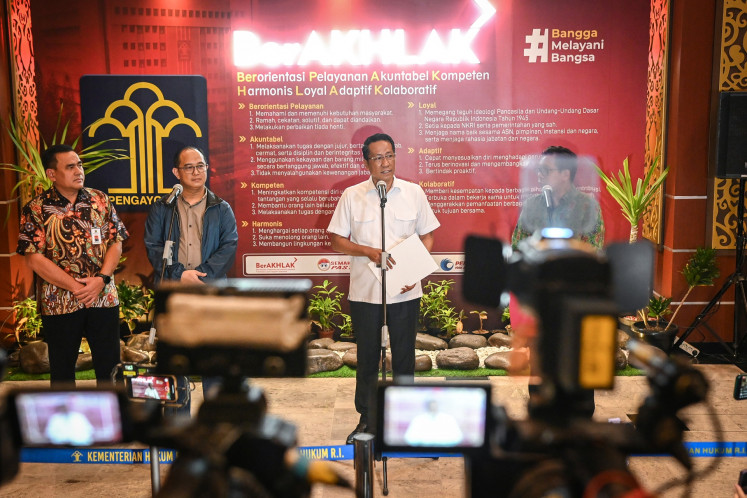Popular Reads
Top Results
Can't find what you're looking for?
View all search resultsPopular Reads
Top Results
Can't find what you're looking for?
View all search resultsRI coal outlook based on local factors, not Trump
While coal prices unexpectedly reached an all-time high ahead of US president-elect Donald Trump’s victory, the country’s coal mining sector must still rely on the domestic market as doubts have arisen about Trump’s ability to revive the coal industry
Change text size
Gift Premium Articles
to Anyone
W
hile coal prices unexpectedly reached an all-time high ahead of US president-elect Donald Trump’s victory, the country’s coal mining sector must still rely on the domestic market as doubts have arisen about Trump’s ability to revive the coal industry.
Thermal coal in the Australian port of Newcastle, the benchmark for Asia, traded at US$105.81 per ton at the end of last month. Reuters reported that this was 109 percent higher than at the end of 2015 when coal prices slumped as a result of overproduction and sluggish demand from the main coal buyer China.
It was part of Trump’s campaign last month to boost the coal industry in the world’s second-largest economy. Will it affect the world’s coal industry, especially Indonesia as the main coal exporter in Southeast Asia? Many people doubt that. Bloomberg has even reported that doubts have arisen recently in the US over Trump’s ability to revive coal’s glory, as abundant shale gas has structurally eroded the coal market.
Therefore, the Indonesian Coal Mining Association (APBI) has expressed its pessimism over the coal price outlook next year. APBI chairman Pandu P. Sjahrir believes that the Newcastle price will experience a retreat of around $30 per ton next year, leaving the price to settle at around $80 per ton.
The price is expected to remain at between $60 and $80 per ton next year with China continuing to control its coal production. This is expected to help boost production of a few Indonesian coal-mining companies with large reserves, but will prove unhelpful for the majority of smaller miners.
Furthermore, according to Pandu, it is unlikely that coal production will reach the record high of its glory days in 2010 and 2011, even though Indonesia will remain a major coal exporter over the next few years.
The association believes that Indonesian coal miners are still relying on the government’s plan to procure 35,000 megawatts (MW) of additional electricity by 2019, almost 20,000 MW of which will be produced by coal-fired power plants.
“The question now is how to boost Indonesia’s domestic market. For the past three years, [local] production has remained stagnant at around 90 million to 100 million tons,” Pandu said, adding that 200 million tons of coal could be produced annually if the 35,000 MW program was successful.
Last year, Indonesia only produced 383 million tons of coal, falling short of the 425 million tons target. Although this year’s target has been trimmed to 419 million tons, BMI Research, a unit of Fitch Group, predicts that only 314 million tons will be produced by the year-end. However, this will be followed by a subdued 3 percent year-on-year growth starting this year until 2020.
BMI Research commodities analyst Sabrin Chowdhury observed that the country’s exportable surplus would stagnate as result of both government policy to conserve domestic reserves and strong demand from local coal-fired power plants.
State-owned electricity company PLN has predicted that by 2025, 50 percent of all electricity will be procured from coal-fueled power plants, whether they be steam or combined steam-gas power plants.
She noted that the government’s appetite for coal-fueled power plants also stemmed from its eagerness to move away from diesel-fueled plants since domestic demand for oil has far outgrown production.
“In order to reduce the impact on the current account deficit from oil-based power generation on its current account deficit, we expect coal to play a larger role in Indonesia’s power sector given that the feedstock can be sourced locally,” Chowdhury said.
Thus, she projects that coal would “remain king” despite emphasis on the use of cleaner energy sources and the outlook for future investments in the Indonesian coal sector was still positive, especially as the government has provided as an incentive the “cost-plus” pricing scheme.
The Energy and Mineral Resources Ministry recently revised a ministerial regulation on mine-mouth power plants, which previously stipulated that the cost of coal bought by electricity producers would be based on production cost and a margin between 15 and 25 percent.
The revised regulation, issued in September, stipulates that although the margin will be maintained, the coal price must be negotiated business-to-business. The scheme was changed following months of resistance from PLN, which claimed the “cost-plus” scheme was economically unfeasible.
The ministry’s mineral and coal director general, Bambang Gatot Ariyono, expressed his optimism that the new scheme would help achieve this year’s non-tax revenue target of Rp 30.1 trillion (US$2.3 billion). According to ministerial data, Rp 19.26 trillion, or around 64 percent, of the target has been reached by the beginning of October.
-------------------
To receive comprehensive and earlier access to The Jakarta Post print edition, please subscribe to our epaper through iOS' iTunes, Android's Google Play, Blackberry World or Microsoft's Windows Store. Subscription includes free daily editions of The Nation, The Star Malaysia, the Philippine Daily Inquirer and Asia News.
For print subscription, please contact our call center at (+6221) 5360014 or subscription@thejakartapost.com










